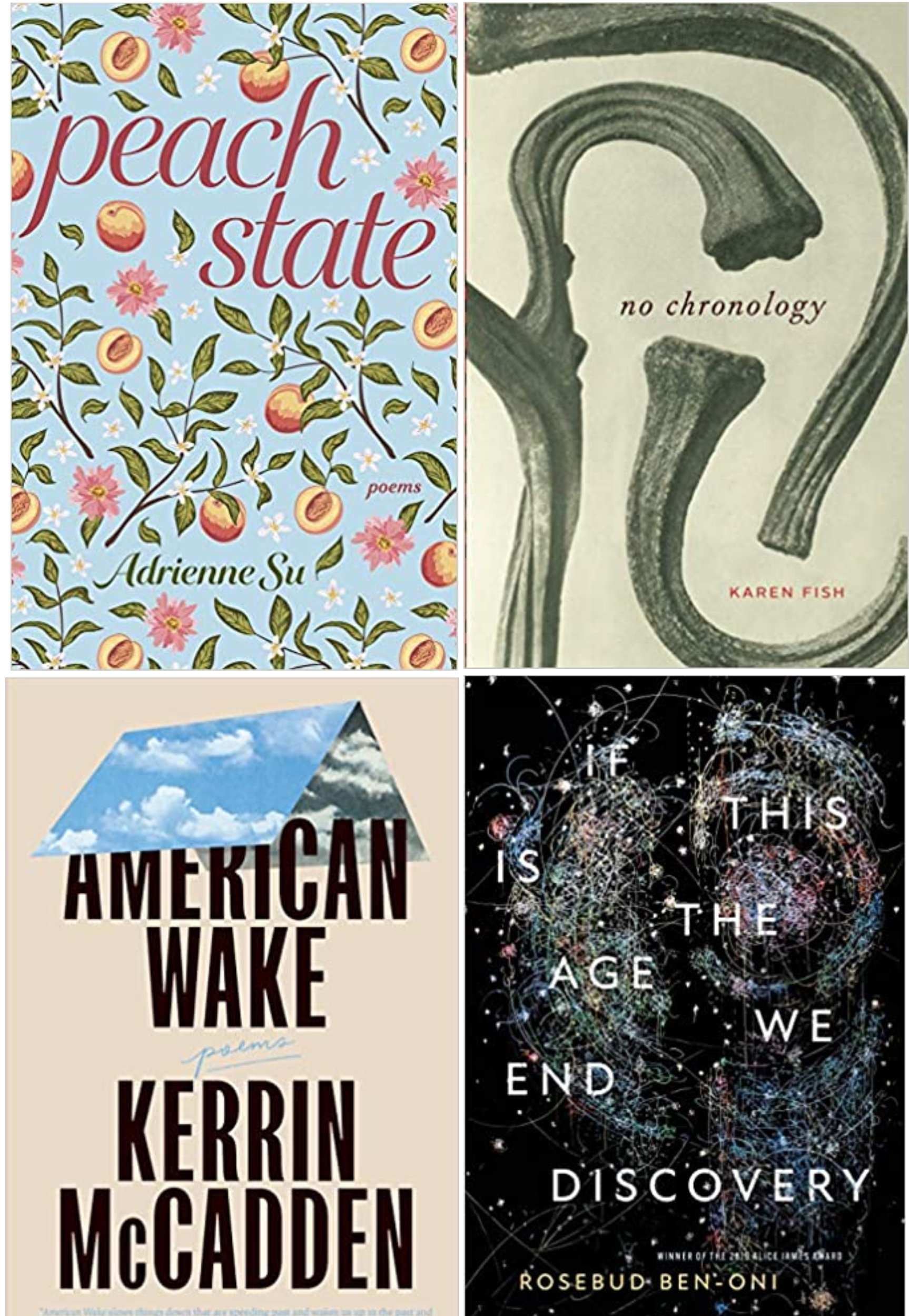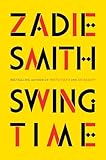Here are six notable books of poetry publishing this month.
 Peach State by Adrienne Su
Peach State by Adrienne Su
An exquisitely textured book. Food is a language, and Su follows its turns and tastes. She announces in “Ginger”: “We’ll affirm its arrival / when it’s not in the titles / of recipes in which it figures / quietly, as moderate slivers.” She rails against recipes that include the admonition to “serve immediately”: “Already the days // overflow with imperatives.” She laments that in “Home Baker,” “Art becomes chore, / your hair, clothes, the floor flecked with powder.” Be wary: “Having baked before marriage for the one you chose, / you pay to the end. Courtship is delusionary, // bread corporeal.” There is an unfortunate paradox: “Now, despite furnishings, a loaf / has the heft of a gift, the hours a miniature life / not spent on a book or a song.” Poems like “Peaches” cover much ground. “I thought everyone bought fruit by the crate,” she writes, “stored it in the coolest part of the house, / then devoured it before any could rot.” Other Georgians ask her “But where are you from originally,” and she wants to quip “The homeland of the peach.” She writes about being “Chinese in that part of America, both strangers / and natives on a lonely, beautiful street,” and considers her parents: “Their lives were labor, they kept this from the kids // who grew up to confuse work with pleasure, / to become typical immigrants’ children, / taller than their parents and unaware of hunger / except when asked the odd, perplexing question.” Peach State is so deliciously crafted through food that it makes me wonder why poetry is written about anything else.
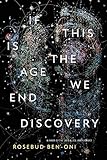 If This is The Age We End Discovery by Rosebud Ben-Oni
If This is The Age We End Discovery by Rosebud Ben-Oni
Most of these poems include the narrator wrestling with something: an ode to her brother, happy little clouds, derelict spacecraft, and Rick & Morty (but mostly Rick). “All my timelines lead to this poem,” she writes an especially apt poem about pondering life in a possible simulation. “I suspect / my own veins are rogue simulations/ flitting with a new kind of heightened self- / awareness. Proof: the nurse says they are flighty / & hard to find.” The f sounds of those lines capture the fluttering sense of ourselves: are we really here? Do we always awaken to the same world? “It’s also sad to think / the envy still filling us over some horse / we knew for less than a week / is simulated,” she says. Ben-Oni’s poems often spray across the page, her lines reaching for the edges as if they seek to uncover the outlines of our tenuous existence. In one wonderfully heartfelt poem, “All Palaces Are Temporary Palaces,” she writes of how her six-year-old niece calls her to ask questions. The girl talks of asteroid mining, comets, quarks. “My dear, dear girl,” the narrator responds, “Calling on this overcast day in the spring, where sky is one, long cover / Of impassivity. Why are we here? She’s asking for the first time, / And I hear the anxiety of one who’s stumbled upon a burning / Temple in the fields.” Ben-Oni courts wonder throughout this book, while acknowledging that opening ourselves to the search can be perilous.
 American Wake by Kerrin McCadden
American Wake by Kerrin McCadden
Impressive range in this collection, both within and across poems. In “Objects in Mirror Are Closer Than They Appear,” she asks: “what isn’t closer than you thought?” Bills, of course, but also “texts from an ex-husband that you have cleverly given / his own ringtone—the science fiction one, / so that every time he wants something / he breaks into your village home like a flying saucer / landing on earth, so close, all of a sudden / the peace and quiet you have built shattered.” Funny lines, but we sense the tension here, the hesitancy. “A Hagiography” is more comfortably hilarious: “Heads will roll, we say when shit gets bad, / but they don’t anymore—no more Saint Alban, // his head rolling downhill into a well, the water / turning holy.” More good questions: “Where was Saint Denis going when he walked / downhill into Paris, holding his head in his hands? // Where does anyone go with their head in their own hands? And what sermon does he give, this man gone walking // and praying, having played chicken without backing down / from men with swords, scourged and racked?” McCadden’s ability to shift without jarring owes to her care with sound and setting, as in “Our House Behind the Hawthorns”: “Our house // is just stone walls—a box filled with rusted bed- / frames and ploughs.” “Work and haul, kettle and hook, / stick broom, dirt floor, turf-light. At night, tiptoe / the edges of thirteen people sleeping.” When I read the lines “The sheep say their words / with their heads low, as if they know a story // is a sacrament” I feel an inclination toward the spirit that also permeates “The Dead.” The narrator watches her mother at her grandmother’s grave, “surveying lots, / approving and disapproving care and neglect.” She knows: “They worry I won’t keep the graves when they’re gone.” Elsewhere McCadden ponders her Irish lineage, in solemn pieces like “Saying the Rosary, Station Island.” An aged priest leads parishioners in praying the rosary. “I didn’t come for this,” the narrator admits, “but it takes me, and soon / I am walking outside, around and around the chapel, the priest // droning another decade, all of us walking in a circle.” They move “past the lake, past the holy water font, past the restrooms // where the Dyson hand-dryer joins the droning, a little engine / of extra prayer.”
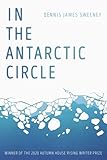 In the Antarctic Circle by Dennis James Sweeney
In the Antarctic Circle by Dennis James Sweeney
Appropriately enough, I settled into this book during a storm that dropped three feet of snow. The mood was externally set, but Sweeney’s book will get you there in any weather. In these prose poems, an unnamed narrator and a companion, Hank, exist in some ethereal plane in Antarctica. “The bed yawns under us,” Sweeney writes, on the introductory page. “He and I grip fingers. Thighs on thighs like batons.” We might consider this a prose-poetic play, discovered in scorched fragments. Each poem has coordinates as its title, leaving us somehow both exact and dizzied. Where are we? Hints of Samuel Beckett and William Gass (snow, wind, eternity, terror) haunt this book. “You will learn,” the narrator warns: “In a whiteout you cannot see shadows, but that does not mean the edges are not there.” Sweeney startles with the precision of his figurative description: “Harpoons loll in our arms like children too old to be held. Along the horizon animals run, disappearing over the brink of snow.” The narrator and Hank might be in love; they might simply be among each other, as we tend to gravitate toward what is warm when we are freezing: “Our rites of love and boredom circle each other, waving their leather whips.” Their purpose in this land is less clear than the explorers that Sweeney critiques. They are often powerless in this book: “Though no savior is due, we make a life of waiting.” The narrator ultimately sighs: “The world has less to offer than you think.”
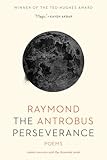 The Perseverance by Raymond Antrobus
The Perseverance by Raymond Antrobus
“Echo” is a perfect choice as the first poem for this book: “Gaudí believed in holy sound / and built a cathedral to contain it, / pulling hearing men from their knees / as though Deafness is a kind of Atheism.” The narrator continues: “Even though I have not heard / the golden decibel of angels, / I have been living in a noiseless / place where the doorbell is pulsating / light and I am unable to answer.” In a later poem, he explains that this is “the reason I sat in saintly silence / during my grandfather’s sermons when he preached / The Good News I only heard / as Babylon’s babbling echoes.” “Dear Hearing World” is a dynamic poem, an ars poetica and more. “I am equal parts sick of your / oh, I’m hard of hearing too, just because / you’ve been on an airplane or suffered head colds. / Your voice has always been the loudest sound in a room.” The narrator’s mother remembers Robert Plant, the “cheeky bugger,” who tried to haggle down her prices. “I didn’t care about Led nothing. / I’m just out in snow on a Saturday market morning / trying to make rent and this is it.” He recalls his father in “Dementia”: “When his sleeping face / was a scrunched tissue, / wet with babbling,” the narrator went close to him, “unravelling a joy.” The narrator then “swallowed his past / until your breath was / warm as Caribbean / concrete.” He understands dementia will take its course, but prays that it will “make me unafraid / of what is / disappearing.” Antrobus can be gentle, tactile, and pointed in this book—which collects into an affirmation, a pronouncement.
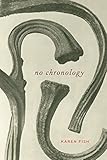 No Chronology by Karen Fish
No Chronology by Karen Fish
In “Alibi,” Fish perfectly captures youth: “I knew nothing about anything: school, dreams, tornados, / strangers, smoke-filled bars, silent, oblivious mothers, / the teenage girls across the street, swaying and sashaying through the late afternoons with transistor radios.” She remembers how those years were full “of abrupt boys / running, stopwatches, athletic accidents, stitches, // snuck cigarettes, stashed girlie magazines, pogo sticks, / headlocks, handlebars to fall from.” Elsewhere in her book, there is the sense that the world will pass us: “The river forgets the fish, and the winter sun slides beyond / the far hills.” There’s a similar awareness in “The Accounting”: “Of course, there is some accounting, / right as you leave this world—stepping down // the rocky embankment, a purgatory.” Fish is absolutely exacting in her description, as during “Evening Song”: “The daylilies wince sut, reduced to orange tongues / waving by the woodshed, woozy on the wind.” and in another poem: “Living in the country, the great spaces / between the houses. The river just a black line / that underscored the sky.” And another: “Like most beauty— / the deer arrive unnoticed and then, / simply, are indisputable.” These precise lines (emotionally, syntactically so) are a stay against the mortality she reminds us of elsewhere. That’s comfort enough, I think, for now.
